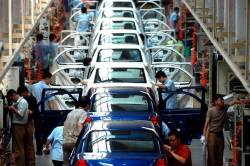
— For the first time, researchers have determined that using employee overtime and increasing the number of factory-installed options on vehicles cause an increase in manufacturing-related car recalls.
Conducted by the Kelley School of Business at Indiana University and the Carlson School of Management at the University of Minnesota, the study says each car recall has a potential economic impact of more than $20 million.
For the study, researchers examined recalls of all vehicles made in North America by Chrysler, Ford, General Motors, Honda, Mazda, Mitsubishi and Toyota from 2000 to 2006. Data was collected about production at 32 plants, 80 car models and a sample size of 232 car model years.
Over a seven-year period, assembly workers operating at near or overtime levels caused recalls that cost about $167 million. Additionally, tired employees can prevent high quality assembly and temporary employees may not be equipped to do the job needed and do it accurately.
Researchers found if a car manufacturing factory runs on consistent overtime, recalls caused by manufacturing errors increase by more than 300 percent. Overtime is described in the study as the assembly plant working its current staff extra hours, or the plant temporarily hires an extra shift of workers to increase capacity.
Adding Options to a Car Increases Recalls
Adding options to a car also added to the number of recalls and the cost of those actions over a seven-year period. Based on an average recall cost of $200 per car and an average of 10,000 cars per recall, researchers say adding as few as four extra options can lead to two extra recalls.
Those two recalls can cost the equivalent of $46.2 million in additional costs to automakers over the seven-year period.
The complexity of adding options also affects workers and recalls because numerous options can be installed on each car. Switching between different tasks to install options within a short period of time adds complexity to the job and it also affects quality inspectors who feel under increased pressure and end up missing mistakes.
According to those directly involved in the study, three former GM executives have read the paper and agree with the findings.
University researchers continue to examine several different leading causes of recalls to learn how to reduce future recalls.
The study passed peer review and was accepted for publication in the journal, Management Science.




